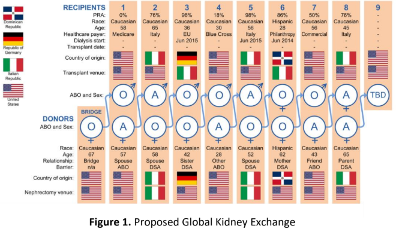
Global kidney exchange: framework, simulation, and ethics for a pilot program
Bianca d'Antonio-Bertagnolli1, Simone Khouzam1, Myles Dworkin2, Mark Shapses3, Michael A. Rees4,5, Ignazio R. Marino6.
1Sidney Kimmel Medical College, Thomas Jefferson University, Philadelphia, PA, United States; 2Orthopaedics, Brown University, Providence, RI, United States; 3Internal Medicine, Washington University in St. Louis, St. Louis, MO, United States; 4Urology and Pathology, University of Toledo, Toledo, OH, United States; 5Alliance for Paired Kidney Donation, Toledo, OH, United States; 6Thomas Jefferson University, Philadelphia, PA, United States
Introduction: While the global burden of end-stage renal disease (ESRD) continues to escalate, access to kidney transplantation remains insufficient to meet the need. Global Kidney Exchange (GKE) responds to this growing public health crisis by matching willing, but incompatible donor-recipient dyads in an international chain of transplant procedures. Furthermore, GKE offers highly immunized patients (PRA>90) the rare opportunity for transplantation, providing improved quality of life and better clinical outcomes, cost-effectively and equitably.
Objective: Simulate GKE structure and model as a pilot program for kidney exchange across three continents, discuss the ethical implications of a GKE program, and provide a cohesive structure for future GKE implementation worldwide.
Design/Methods: A simulated GKE chain of transplantations was identified using actual patient data from the United States (US) pool of the Alliance for Paired Kidney Donation, at a single point in time, supplemented by additional international pairs from Germany, Dominican Republic, and Italy. The research team identified virtual crossmatch negative matches and formulated a feasible financial framework based upon the different reimbursement rules and regulations of the different countries involved. Detailed logistics for the simulation of the chain are also described.

Results: The simulated transplant chain was initiated with a non-directed donor from the US and involved 8 donor-recipient pairs across four countries. The final bridge donor kidney was anticipated to be matched to a candidate on the US deceased donor waitlist. The transplant surgeries were planned to take place at pre-selected high volume transplant centers in either Italy or the United States. Logistics of organ procurement and transplantation were organized to align with the regulation of the countries where procedures were to be performed.
Conclusion: GKE is a feasible, equitable, and ethical method that facilitates worldwide kidney exchange and provides a conceptually sound way to match willing, but incompatible donor-recipient pairs. This program offers great potential to alleviate the morbidity and mortality of ESRD and narrow the gap between low access and high demand for kidney transplantation. GKE is a sustainable platform that leverages the financial savings and existing infrastructure of paired kidney transplants to unify healthcare systems to alleviate organ access disparities.

right-click to download
